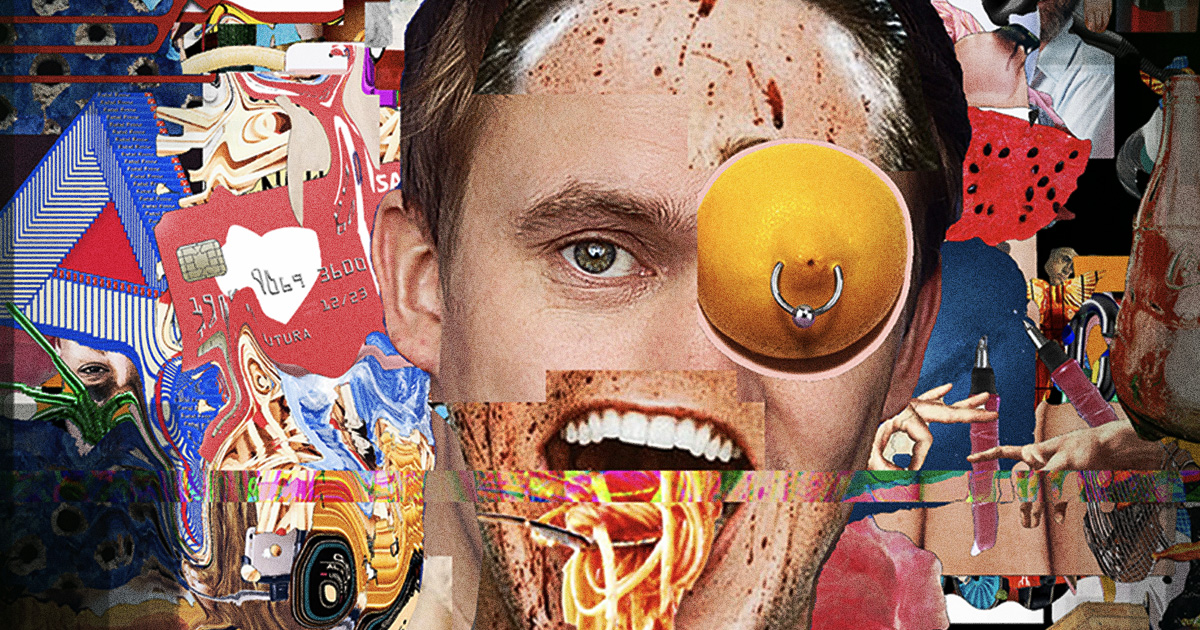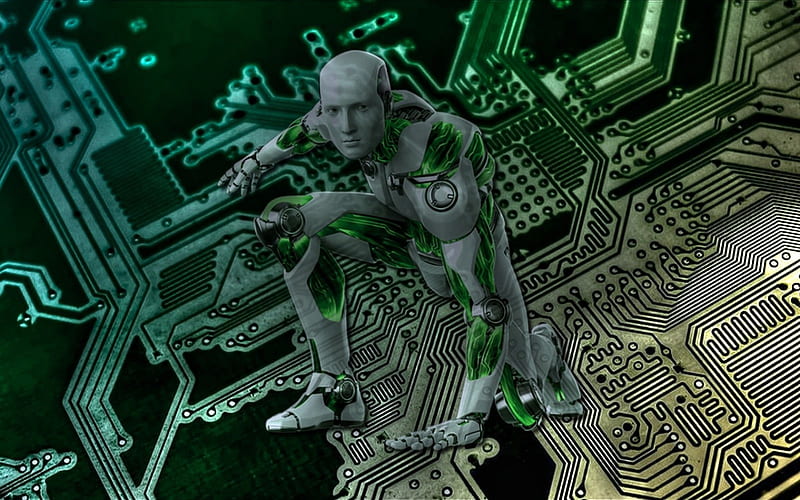There are only these two things in life – copying and creativity. There are only these two things and there is nothing in between them. ‘Copying’ is where we build upon what we have already been provided with, whilst ‘creativity’ is where we go right back to the drawing board and start off completely new. There is no ‘building’ in creativity in other words. Clearly, it’s only the one thing or the other – we can’t copy and yet be creative and neither can we be creative and yet the same time ‘avoid the risk of creativity’ by copying. This is why Gauguin says that ‘all art is either revolution or plagiarism’.
When we apply this principle to the psychological realm we can see that there are all the makings of a deadly trap here, a deadly trap that we as a culture have precisely zero insight into. The trap springs into action just as soon as we allow ourselves to become invested in copying-type activity, just as soon as we succumb to the idea that we can actually get somewhere this way. This is a very easy notion to subscribe to because – in the initial stages at least – there is the very compelling impression that we are progressing. Cheating is a classic example of this – if – in an examination setting – I copy the answers of the guy sitting next to me then I can get a good result without putting in the work of studying. In the long run, however, this doesn’t do me any good because I haven’t only avoided the work, I have also avoided learning too!
This isn’t a question of morality but practicality – when we are in the first phase of our lives then there is an immediate payoff for social adaptation, for being like everyone else. We ‘get along by going along’. At secondary school or college, we find that we can gain popularity via the strategy of ‘echoing the attitudes and behaviours of those around us’; if we can’t fit in in this way then life is tough for us and we find ourselves painfully isolated. In the long run however, getting on by going along no longer works for us but against us because we’ve lost all authenticity. If we had done the work of discovering who we really are (which is the work of individuation, the work of becoming an actual individual) then we would reap the benefits – so to speak – that come with this; otherwise we reap something else, we reap the suffering of not being who we are, as Kierkegaard puts it. This suffering corresponds to the ‘negative adventure’ that is spoken of by Joseph Campbell.
Going back to the drawing board is very arduous, very painful and – almost inevitably – very disappointing. What’s actually going on here is that we’re doing the work that we avoided earlier – we’re paying back the debt we owe with interest, and so even though copying seems to be an easy and quick way of progressing, it doesn’t actually get us anywhere at all. We end up falling into a hole, a hole from which it is very difficult to climb out of. Being addicted to a drug such as heroin or alcohol illustrates this dilemma very well: everything happens very easily at first and life seems so good that we never question would we’re doing (which is of course the so-called ‘honeymoon stage’); we’re getting all the rewards with none of the work (this is how the drug heroin got its name, because it makes the user feel like a hero without the need to actually do anything heroic) but the easy route leads us to a very dark place, a place that will take us an awful lot of work to get out of. As Virgil says – ‘Easy is the descent to hell…’ If we don’t understand this then we’re in for a very unpleasant surprise; we thought we were onto a good thing, but the truth of the matter reveals itself to be the complete reverse of this.
Essentially, what happens in life to all of us is that we get addicted to ‘social copying’. Approval is our heroin, just as Anthony de Mello says, and the way to get approval is to do what is expected of us. Copying is easy – we are provided with the rules of the game and so all we have to do is follow them. This is the easy way to live life therefore – we live the version of life that everyone else is living and this way we get to avoid the work of figuring it out for ourselves. We avoid the work of ‘thinking for ourselves’, as it is said. “Please tell me what to think”, I beg, “please tell me who I am and what I should be doing in life…” and as soon as we ask this question (whether or not we’re conscious of asking it) the External Authority will step in to do just this for us. We don’t have to ask twice, any more than a sheep would have to ask twice to be devoured by a hungry wolf! There is always an external authority waiting out there, waiting to determine every last thing about us, and when we get on board with it (when we jump on the bus, so to speak) then there are all sorts of enticing benefits that we can earn. We get paid in hard cash for adopting the socially approved persona, as Jung says; once we have allowed ourselves to be defined in terms of the system then we discover that there is a whole world out there for us to slot ourselves into – we discover that there is a complete way of life awaiting us, a way of life which has already been mapped out for us, so that all we have to do is follow the signposts.
It is apparently possible for us to ‘advance’ within the remit of the Presented World and this becomes our aim in life, this becomes our all-consuming concern, our main business. The game of ‘succeeding versus failing’ takes a grip up on us and so we strive as hard as we can to ‘make something of ourselves within the terms of the system’; if only we can succeed in society, we think, then everything will come out right. In reality however nothing could be further from the truth – nothing awaits us as a result of adapting ourselves to the system apart from what we might call our ‘inner death’. In chasing success in the eyes of the world we inevitably cheat ourselves out of life itself, which has nothing to do with copying others! I copy you and you copy me and we all copy each other, and at the end of all this we will find ourselves part of the insalubrious ‘Circle of Fools’ which is society, the fear-driven collusion which is made up of all those of us who have cheated ourselves out of our own unique, not-to-be repeated lives for the sake of the quick pay-off.
This copying business goes far deeper than we might imagine – the mental construct we call ‘the self’ is the quintessential copy. There is in other words no such thing as an original self, no such thing as a unique self, no such thing as a self which is not the generic product of the thinking process. This is very hard for us to see because we are brought up to believe that every self in the world is ‘special’ – which is to say, not the same as all the others. The reverse of this is true again, the mind-created identity or self-construct is utterly generic, utterly lacking in uniqueness or individuality, just as all the products of the thinking machine are. ‘Me’ is always a generic thing and this is why we have to put so much effort into trying to distinguish ourselves, so much work into trying to excel. The reason the ego is always trying so hard to excel, always trying to do one better than its competitors, is because it needs to disprove the repressed awareness that it is in fact completely ubiquitous, completely unremarkable. The ego is bursting itself trying to prove that it is what it isn’t.
In order not to be completely bland, completely blank, completely without any unique or original character, we would have to do actual work, as we have already said. The only work the self-construct ever does – the only type of work it is capable of doing – is ‘copying-type’ work, and this is not real work at all. Far from being ‘real work’, it is cheating. Copying and competitive behaviour are of course two different ways of speaking about the same thing – what we’re essentially doing is ‘adding to ourselves’ or ‘accumulating’, and this is taking us in the opposite direction of conscious work. Conscious work means divesting ourselves of what is not us (or ‘letting go of what is unworthy of us’) and ditching the template of selfhood that we have been provided with. Work involves subtracting, not adding! If we are to live creatively then this means letting go of all templates, or platforms, all prescribed formats. We can’t hang onto any of that, as we started out by saying. We can’t be in Copying Mode and Creative Mode at the same time. To be creative is to go beyond the self (i.e., it is not a question of building upon it, of improving or developing it) and this just happens to be the very sort of work we don’t want to do. Instead, we want to compete successfully as ‘the generic self’ and the incentive for this is the hope that we will manage to distinguish ourselves, the hope that we will ‘stand out from the crowd’.
The problem here of course is that we are all doing this and so there is nothing so very unique about us at all! It’s like an advert on TV which urges us to buy some personality-enhancing product so as to prove to everyone that we’re not the same as every other dumb idiot who might be watching the advert. All the Generic Self can ever do is flirt with the idea of being different, which it does by following fads and fashions. By ‘staying ahead of the pack’ we can create the theatrical appearance of being an individual and this is the most we can ever hope for. To really be ‘different’ to everyone else we’d have to take the risk of going beyond the staged life of the self-concept, but because of our great fear of ‘letting go of what we know’ we simply aren’t prepared to do this…







Robert
Hi Nick
I just listened to “All in the mind” the radio 4 program about psychology and mental health. It was so banal and dumbed down, obsessed with research. One part of the program was about the first letter of your name and that you are more likely to pursue a career with the corresponding letter. For example Dave would becom a dentist, or Francis would become a Firefighter or even more likely if you were Dave from Durham = Dave the Dentist from Durham.
Take a listen to the latest program – your conclusion that mainstream psychology is utter bullshit is right on the mark.
Look forward to your reply if you get to listen, it’s on the BBC sounds app.
zippypinhead1
I will definitely check that out. I am always amazed at how the ‘official’ approach to psychology is so dumb-sounding (like you say) and condescending. It amazes me every time. Is there any reason why a science that is concerned with what it means to be a human being should keep on coming out with endless banalities? Jung has a quote, maybe from the nineteen thirties or something like that, predicting that the disciple of psychology would disappear up its own backside (he didn’t actually use those words) if it carried on the way it was going. There has been almost 100 years of ‘progress’ since then and I guess you could say that he wasn’t wrong….
zippypinhead1
This is one quote by Jung (but not the one I was looking for) – “Anyone who wants to know the human psyche will learn next to nothing from experimental psychology. He would be better advised to abandon exact science, put away his scholar’s gown, bid farewell to his study, and wander with human heart through the world.”